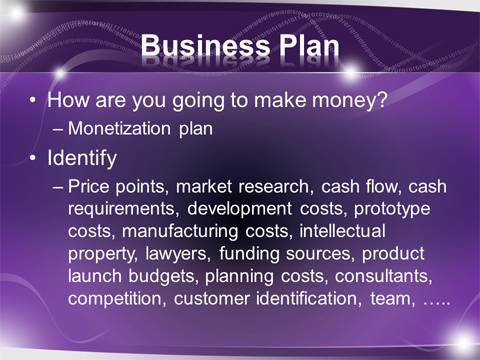
 You now have this whiz bang idea that you are going to sell millions of; great! Do you have a plan? As you recall from above, hope is not a plan. You will need to figure out how this project is going to make money and how you are going to pay for all of the costs you’ll incur on the way there. There are just a few dozen key aspects you’ll need to assess.
You now have this whiz bang idea that you are going to sell millions of; great! Do you have a plan? As you recall from above, hope is not a plan. You will need to figure out how this project is going to make money and how you are going to pay for all of the costs you’ll incur on the way there. There are just a few dozen key aspects you’ll need to assess.

- Price points – How many will be sold at a certain price point. Refresh yourself on the Law of Supply and Demand.
- Market Research – Who is going to buy your product? How much will they pay for it? Are there other requirements to be in this market?
- Competition – Are you the only solution to this problem? How do they price and market their product or service?
- Customer Identification – How are you going to find them? How will they find you?
- Cash Flow – How much will you need to become cash flow positive? What kind of funding tranches will you need? Understand all of your expenses.
- Prototype Costs – You will need to show incremental progress, what will this cost?
- Manufacturing Costs – How much will it cost to make your product? What if you make 100 at a time? What if you make 10,000 at a time?
- Consultants – Find specialized people in their field to help you. And they will need to be compensated.
- Intellectual Property – How are you going to protect your idea? Are you going to pay a patent attorney/lawyer?
- Lawyers – They are not cheap. They can help you do things the right way so you don’t get in trouble later. What will their costs be? Are they setup to work with small entities?
- Funding Sources – Find an investor? Find a partner? Are you going to fund this whole thing yourself?
- Product Launch Budgets – Don’t get to the end and not have the money to tell the world about your company.
- Planning Costs – Everything costs. See above about the plan. You will likely need to compensate specialized parties to help you plan. Business Model Generation by Alexander Osterwalder may be a place to start.
No doubt this looks like a daunting list. It is. There is a lot of work and planning to be done to start a company, and I by no means consider this a complete list.
Marketing
 Who is going to buy your product? Why are you making this product? Marketing determines and conveys the answers to these questions. It’s how you tell the world why and who and what you do.
Who is going to buy your product? Why are you making this product? Marketing determines and conveys the answers to these questions. It’s how you tell the world why and who and what you do.
There are really a few books I have to suggest here that I really just love about marketing:
Start with Why, Simon Sinek. This is an awesome book and really transformed the way I communicate and operate my business.
Tipping Point, Malcolm Gladwell. Fascinating stories about how ideas propagate to the world and market. Really you should read everything from both of these authors.
Back to marketing, there are some key core business questions your marketing plan should answer. Where is this product going to be sold? How many will be bought at a particular price point? Who is going to buy this thing?
Keep in mind that you really may end up with several versions of a marketing plan. Sure, you could sell Bentley’s all day long if you could sell them for $10,000. However you could never get the price that cheap to sustain that model. Everyone could sell millions of their products if the price was cheap enough. So the obvious question is how to you get the price cheap enough, make millions of them to drive the price down. To get the price down, invest in engineering and machinery and process, and to do that, you need a lot of money. See the problem in this line of thinking? You haven’t proven you can sell 1 and you want to invest millions of dollars to make millions of the product. Before you can make and sell a million units, you need to prove that you can make and sell 100, then 1000, then 10,000. Determine how your marketing will change based on your volume.
